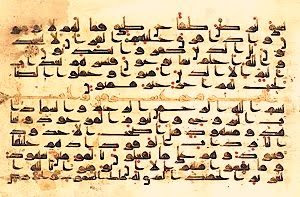
In
last night’s post about honor killing, I quoted authoritative Islamic law to demonstrate that killing one’s children is not punishable under sharia.
The source I cited was
’Umdat al-salik wa ’uddat al-nasik, or
The reliance of the traveller and tools of the worshipper. It is usually referred to as
Reliance of the Traveller when quoted in English. My references were from the Revised Edition (published 1991, revised 1994), which is billed as “The Classic Manual of Islamic Sacred Law ’Umdat al-Salik by Ahmad ibn Naqib al-Misri (d. 769/1368) in Arabic with Facing English Text, Commentary, and Appendices”, edited and translated by Nuh Ha Mim Keller. The publisher is listed as amana publications in Beltsville, Maryland.
The book is considered an authoritative source on Sunni Islamic law because it is certified as such by Al-Azhar University in Cairo. There is no higher authority on Sunni Islamic doctrine than Al-Azhar. To give the book additional gravitas, it has also been certified as an authoritative source of Islamic law by the governments of Jordan, Egypt, Syria, and Saudi Arabia.
Reliance of the Traveller is thus a useful tool for us “Islamophobes”, since no Muslim can credibly assert that it does not represent the “true Islam”.
* * * * * * * * * * * * * * *I mention all this because a reader emailed us this morning with some pertinent questions about
Reliance, and the Koranic justification for its reading of Islamic law. His questions and my responses are below.
Do you have a copy of “Umdat al-Salik”?
Yes, a big thick hardback with a green and gold cover.
I imagine that it is expensive, …Not terribly. I can’t remember the exact cost, but it was normal for a hardback book of that size.
…and that its text is not available online.It is available online, actually. I picked up a text document version (.txt, no formatting), and I also have a huge Word document of it. But I acquired those several years ago, and no longer have the URLs for the sites where I found them.
According to this famous citation from it, a Muslim who kills a non-Muslim and a person (even a non-Muslim!) who kills his/her own child or grandchild must not be punished for the killing. I have never been able to find the Quran passage or hadith on which this impunity is based. Does this “Umdat” citation have a footnote pointing to the relevant ayat/hadith? How do the ulema scripturally justify this ruling?Reliance sometimes cites the Koran and/or the hadith to justify its prescriptions and proscriptions, but not always. In this particular case, no scripture is cited.
The relevant section (O, “Justice”, o1.0, “Who is subject to retaliation for injurious crimes”) begins with several citations from the Koran and the hadith about how much Allah abhors “killing without right”, which he considers an “enormity”.
If Allah (through Mohammed) does not forbid an activity,
it is by definition lawful. The killing of one’s children is
not mentioned as “killing without right” in the Koran or the hadith. One assumes that “honor killings” were a common practice in 7th-century Arabia, as they are today. Thus al-Misri considered it necessary to list them as “not subject to retaliation” so that the
fiqh (Islamic jurisprudence) would be clear on the topic.
That’s my best guess, but it would take an actual scholar to confirm or refute my suppositions.
* * * * * * * * * * * * * * *Some further thoughts on the same topic:
All possible human activities are regulated by Islamic law. If an action is not specifically mentioned in the Koran or the Sunna, its status under sharia is determined by scholarly examination of relevant references that may be extended to cover the activity in question.
 Los Angeles — and in particular, Hollywood — is greeting the New Year with trepidation, after a series of car fires set by an unknown arsonist or arsonists. There is no indication so far of any cultural enrichment in these fires, but the year is young. Stay tuned.
Los Angeles — and in particular, Hollywood — is greeting the New Year with trepidation, after a series of car fires set by an unknown arsonist or arsonists. There is no indication so far of any cultural enrichment in these fires, but the year is young. Stay tuned.


 The latest edition of Der Spiegel offers Islam-critics a real treat: a four-page report on ex-Muslim Sabatina James who is known not to be reticent on the subject of the Most Peaceful of All Religions™. Editor Matthias Matussek — who until recently had a link to PI on his homepage — features the courageous woman, who is under permanent personal protection in Germany. She provoked him with the right words: “You will never publish something like this. You politically correct jornolists are too cowardly for that.”
The latest edition of Der Spiegel offers Islam-critics a real treat: a four-page report on ex-Muslim Sabatina James who is known not to be reticent on the subject of the Most Peaceful of All Religions™. Editor Matthias Matussek — who until recently had a link to PI on his homepage — features the courageous woman, who is under permanent personal protection in Germany. She provoked him with the right words: “You will never publish something like this. You politically correct jornolists are too cowardly for that.” 

 I have been away from blogging most of the day due to other work — actual paying labor, thank the Lord!
I have been away from blogging most of the day due to other work — actual paying labor, thank the Lord!


 Yes, a big thick hardback with a green and gold cover.
Yes, a big thick hardback with a green and gold cover.


